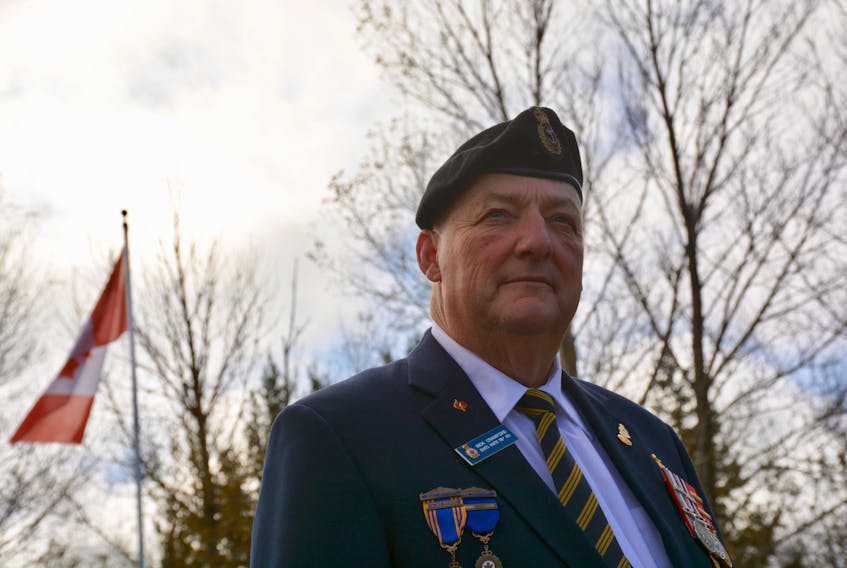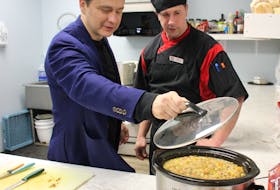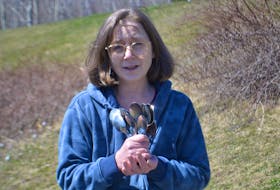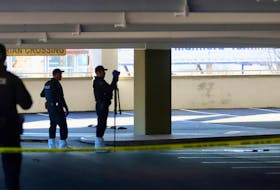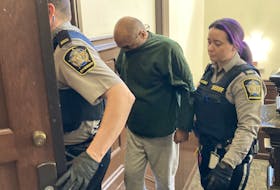TENNYCAPE, N.S. - Rick Crawford lives in a cozy, quiet home by the Minas Basin with his wife, and a clear view of the water. Looking across the cerulean blue waves he can see Economy, on a clear day.
His playful dog Morgan, who’s still got a bit of puppy in her, jumps around excitedly as he reflects back on his days in the Royal Canadian Navy, an organization he served with for 35 years.
His career was bookended by the Cold War and the beginnings of the War on Terror - but it’s still referred to as peace time.
Crawford joined the navy in 1971.
His father was in the army and his grandfather fought in both World Wars.
“I’ve pretty much been in the military for my whole life,” Crawford said.
He’s originally from B.C., but travelled all over Canada and the world while growing up.
He signed up in Quebec City, doing his basic training out of Cornwallis. He then moved to Halifax for his seamanship training before eventually making it on to his first ship, the HMCS Preserver.
The Preserver
The Preserver was a fleet support ship, or as Crawford described it “we carried gas and groceries for the rest.”
Built in 1970, she was almost brand new when he came aboard.
“We were out quite a bit because at that time we had two destroyer squadrons and auxiliary ships,” he said. “When a squadron sailed for the Mediterranean or down south, you’d have to take a gas ship with you.”
It also meant that the Preserver would make stops at lots of ports to refuel.

During one of those refuelling stops, in Lisbon, Portugal, Crawford found himself in the middle of a military coup purely by accident.
“We were there when the (Carnation) Revolution happened back in the 1970s,” Crawford said. “Portugal was kind of a police state and the army wanted to take it over and make it more democratic.”
The Carnation Revolution, which took place on April 25, overthrew the authoritarian regime of Estado Novo.
The revolution also led to Portugal’s withdrawal from its African colonies.
It gets its name, Carnation Revolution, because nearly no shots were fired during the coup.
The day is now celebrated as Freedom Day and is a national holiday.
And Crawford and his shipmates found themselves, unexpectedly, in the middle of it.
“There was a whole bunch of us downtown,” he said. “There was a Canadian, Dutch and British squadron in port. Some American ships too. When the proverbial ‘fit hit the shan,’ we were trying to get back to the dockyard.”
“We were having a beer, just enjoying the evening and then a member of the police came in the bar and they had these truncheons and they just started wailing on everybody,” he said. “I jumped over the bar, the barmaid was a British gal and once the police left we headed back to the boats.”
“Everybody was beating a hasty retreat, trying to avoid the police and staying away from tanks.”
They sailed away once everyone was aboard.
“That was a pretty exciting time for a brand new young fella like myself.”
Navy life
He met his wife while he was serving on that ship, spending most of his career on the East Coast.
“I was out at sea quite often, usually you’d be home for two years and you could be out at sea for two years, up to four years,” he said. “It was fine as a single person, but once you get married and start having kids, that gets a little harder.”
Read More:
War brides of Annapolis Valley share their stories
Veterans remembered with special banners in Barrington, Clark's Harbour
He jumped around to a lot of different ships over his 35-year career in the navy, including the HMCS Preserver, the HMCS Cormorant, the HMCS Fraser and HMCS Iroquois to name a few.
When he retired from the navy, he worked with the Nova Scotia Highlanders in Truro for another few years, retiring when he turned 60.
Now 66, Crawford has been enjoying his retirement on the Hants Shore – spoiling his grandkids, working on his home, hunting and relaxing.
He was president of the Hants North Legion for about two years and is still actively involved with the branch.

Crawford said the navy was always an interesting time – not just for traveling around the world – but for constantly learning new things and training.
“The navy is one of those groups where people I knew when I first joined and didn’t see for 10 years were still friends after all that time,” he said. “You might run into them on another ship, or see them on shore, but you’re the best of friends even after all of those years.”
“I don’t miss the navy as such, I miss the people,” he said. “You do make good friends.”
“When you’re living in quarters that small, you get to know each other pretty gosh darn good,” he said. “You could be living with those people for years at a time.”
Nature of the beast
“Ships are very dangerous places,” he said. “You make them as safe as you can, but at the end of the day, you’ve got explosives, you’ve got weapons, you’ve got fuel, anything could happen at any time.”
“You have to trust the guy beside you, the guy behind you, the guy in front of you, that they’re going to do their job,” he said. “If you trust them, then you sleep tight at night.”
He said every ship had to be a well-oiled machine – the weapon system operators had to believe that the repair crews were up to snuff.
“If the cooks weren’t doing their job and weren’t feeding the guys right, well that would be one of the biggest morale things right off the top. If you’re taking care of the bellies of the troops, then everything else falls into place.”
Crawford said he didn’t lose much sleep as he always had total confidence in his shipmates.
“There was drudgery work, the ship had to get cleaned,” he said. “We did cleaning stations twice a day and once a week, from stem to stern, we turned everything out. It was all cleaned, right down to the brass tax, and you had to do that.”
On Crawford’s last ship, the HMCS Iroquois, he was present when a Sea King helicopter crashed on the flight deck on Feb. 27, 2003.
His office was right underneath the flight deck when it happened.
For him it was a scary incident, but he remained resolved and impressed by how effective the crew’s response was.
Remembrance
What sticks with Crawford now is how important it is to reflect and remember those who have served, especially when it comes to both World Wars, even as more and more veterans pass away.
When he was younger and traveling through Europe, he visited many of the grave sites of soldiers who gave their lives during those major conflicts that defined a century and halted the rise of fascism on the continent.
It’s something that he says had a profound impact on him, suggesting that every Canadian that can should take the same journey at some point.
“The supreme sacrifice was paid by all of those men and women that are in those cemeteries over there, so that we can have the freedoms we have today” he said.

